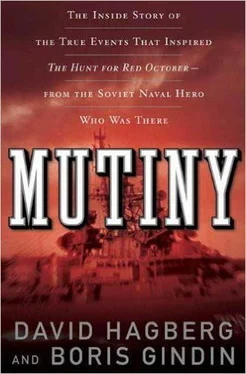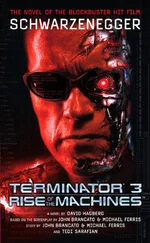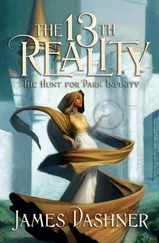“When we get there we will ask the Kremlin to, first of all, treat us as a separate military base and then give us access to a television station and a radio station. I will speak directly to the Russian people and ask them to join us in the fight against injustice.
“This day of celebration for the October Revolution will be symbolic of our struggle. The people will understand. They will be with us, you’ll see. It will be just like when the Potemkin and Aurora rose up in protest. The people rose up in support and the revolution began.”
The irony of this situation strikes Gindin right between the eyes. In the first place, Sablin is the one officer aboard the Storozhevoy whose loyalty is completely beyond question. He is the Communist Party aboard ship. His is the final word in anything that has to do with politics.
And in the second place, all of them in this room are condemned men as of this moment. It won’t just be Sablin preaching treason who will be punished; it will be all of those who listened.
“Now you must make a decision,” Sablin says. “Each of you must search your conscience to find out what is right for you but, more important, what is right for the Rodina.”
He takes the plastic container from the table on the left. The bin holds backgammon pieces, white and black. He sets a white piece and a black piece in front of each officer.
“Now you must choose,” he tells them. “If you are with me, put a white piece into the bin. But if you oppose my effort to save the Motherland, then put a black piece in the bin.”
He’s standing in the middle of the room looking at them, challenging the officers to do the right thing, whatever that might be.
“I promise you that your vote will be secret, if you want it to—,” he says. But all of a sudden he stops speaking. Perhaps he realizes just how stupid his promise really is. After this evening, nothing any of them will do aboard the Storozhevoy will be secret.
Especially not from the KGB.
PART 3
THE GREAT SOVIET FAILURE

Russians have been ruled by lousy systems for most of their history. The tsars with their absolute authority listened to no one but their own caste of nobility. After all, they had God on their side. Who was in the kulaks’ corner? Indeed, what could a rabble of uneducated farmers or street sweepers or factory workers or even merchants understand about governing a country as vast as Russia? That arrogance cost the tsars their nation when in February of 1917 Nicholas II abdicated his power because he refused to take Russia out of the war with the Germans and his loyal subjects objected. Loudly.
The nobility tried to hold on when Prince Georgy Yevgenyevich and then Aleksandr Kerensky formed a provisional government, but neither of them pulled Russia out of the ruinous war, nor would they change the system that denied the peasant-farmers ownership of their own land. This was a dumb move by Moscow, because the peasants constituted 80 percent of the population.
Adding to Yevgenyevich’s and Kerensky’s woes were the Russian intellectuals as a class who disagreed with nearly everything. Poverty was rampant; most of the population was hungry most of the time. The generals and admirals were on the verge of a junta. And mutinies and desertions were widespread, especially among the soldiers and sailors who’d been drafted into the service. When they got back to their hometowns, they gave their weapons to the angry Socialist factory workers who were ready to move on the government.
One faction of these new revolutionaries, who called themselves the Bolsheviks, which was just another word for the most radical of the Socialists, came up with a slogan— Land, peace, and bread —and the concept of a system of what they called soviets that ignited the entire country into an all-out civil war.
A soviet was a council of delegates elected by factory workers or employees of other businesses. The soviets had no official status in the provisional government at that time, but theirs were the voices of the people, and Moscow did listen as best it could. Actually, it was a more up close and personal form of democracy than existed in the United States.
But once the October Revolution was over with and the government had been toppled and a constitution had been drafted, all the soviets across the country got organized and started reporting to what was called the Supreme Soviet in Moscow. It was the highest legislative body in the country, akin to the Congress in Washington. The highest executive branch of the new government was the Politburo. And the first leader of the new Soviet Union was none other than Vladimir Lenin, who was the Bolshevik leader of the Communist Party.
Lenin’s first act was to withdraw from WWI, turning over most of Belarus and Ukraine to Germany.
But his second, even more important, task was to fight a civil war that threatened to unravel everything that the soviet system had accomplished and destroy the country. But at least they had the peasants, the workers, and the conscript soldiers and sailors behind them.
This is where the hard feelings against the Western powers, especially the United States, got a start.
The supporters of the tsars and the old regime formed a resistance army called the Whites to fight against the Communists, called the Reds. Had it merely remained an internal struggle it’s possible that the Cold War would never have occurred. But a coalition of allies led by the United Kingdom, France, and mostly the United States, attempted to invade the new Russia to put down the Communists and restore the old royal regime to power.
It didn’t work, of course, though it took the Reds until 1922 to prevail. And besides the future Cold War, it spawned a whole new way of thinking about governing a people.
Before the revolution, Lenin and his Bolsheviks argued that it would take a tight-knit and secretive organization to overthrow the government. And, they argued, because of the civil war aided by Western powers it was going to take the same sort of tight-knit, secretive organization to run the government. Lenin and his pals saw such a government as their only way out. After all, the three most powerful nations on earth were lined up against the Communists.
But Lenin went a step further by doing something no one in the West could fully understand or appreciate. To begin with, he banned all other factions or political parties. The new Soviet Union was to be a one-trick pony. Most important, he argued that the Party should consist of an elite, highly trained cadre of professional and dedicated revolutionaries who would be willing to devote their lives to the cause.
Only Party activists were put in charge of the bureaucracy, factories, hospitals, food suppliers, universities, and the military.
Loyalty and iron discipline were the new watchwords. It was called the nomenklatura system. It was the standard practice, if not the law of the land, in full force that early November 1975 in Riga.
This was supposed to be Russia’s answer to democracy. The elections started at the bottom and worked up, but the orders and policy decisions started at the top and worked their way down. Before long it became tantamount to treason to question the top-down orders. And in order to protect the elite from challenge by the majority of the population, who were, after all, only kulaks, to rule meant you had to be a member of the Party. And in order to be a member of the Party you were required to take special courses, attend special political indoctrination camps and schools, pass a series of tough exams, and finally be nominated by three members of the Party who were in good standing.
Читать дальше













